
The Power of the Russian Hulk
/ Главная / Russkiy Mir Foundation / Publications / The Power of the Russian HulkThe Power of the Russian Hulk
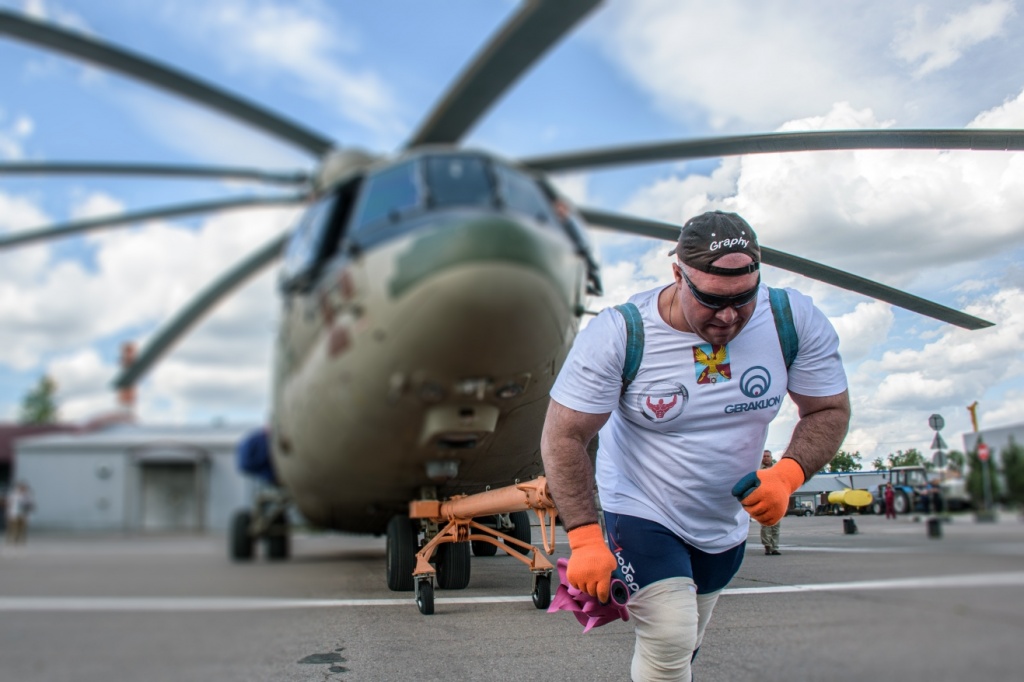
Sergei Agadzhanyan, a man of muscle from outer Moscow, has been nicknamed the Russian Hulk for a series of world records in towing multi-ton machinery. In order to amaze the audience, the Russian man does not need trick effects, huge budgets, and special devices - he simply moves trains, planes, trucks, and motor ships, blowing rubber hot-water bags to rupture along the way.
In October, Sergei Agadzhanyan set another world record towing a convoy weighing more than 53 tons for almost 5 meters. The athlete dedicated his achievement to the 800th anniversary of the birth of Alexander Nevsky. In May, on the Day of Slavic Script, he towed a Mi-26 helicopter weighing more than 40 tons becoming a world record holder in three categories simultaneously. And in September 2020, he towed a passenger plane in Kazan for 35 meters.
The record holder and chairman of the RosMolSport in Moscow Region Sergei Agadzhanyan believes that his performances are valuable not as records, but as a message to young people - sport accomplishes wonders. He told the Russkiy Mir about his Soviet childhood, physical and spiritual training for feats of power, distance competitions with foreign colleagues, moving vehicles for the sake of records and work, as well as his attitude to the nickname Russian Hulk.
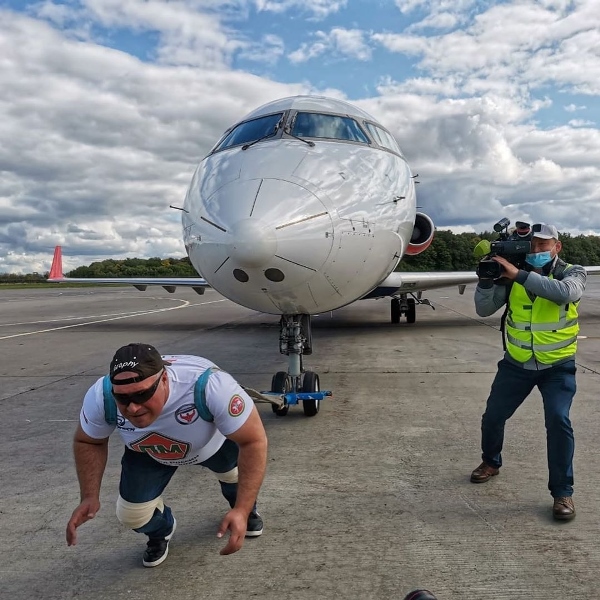
"I used to break hammers, axes."
– Many powerlifters have stories from their childhood that prompted them to take up weights and barbells. Judging by their stories, many of them were weak in their youth and got ridiculed. What were your reasons?
– This is indeed the motivation of man. While he is growing up and has not yet become a fulfilled spiritual person, he is guided by his instincts for self-preservation. Any person’s development is affected by external factors in addition to his upbringing. I got my understanding of the importance of a healthy lifestyle in my family; my father was always involved in sports, and my brother was a hockey player.
As a child I was a rather short guy, objectively speaking, and I did not stand out in terms of great power. Until ninth grade, I was less than 5.6 ft. Of course, there were some fights with my peers, even though I had always been a peaceful, even-tempered person. But those attacks motivated me to move forward, to improve myself. I made a big leap forward in all my indicators through regular and painstaking sports training. I did boxing, kickboxing, kayaking, and kettlebell lifting. That base helps me to this day.
"The foundation of my strength endurance that helps me in my power performances was laid by Soviet sports."
– Did you feel an innate power?
– I remember when I was 15 years old and was watering the bushes. Back then I had already gained some level. And when I put the hose on the metal faucet, it broke. It was a frequent problem. I used to break hammers, axes. There was a genetic disposition, I'm convinced of that; I'm an athletic person from the anthropological viewpoint. It is easier in some ways because people of such anthropology quite quickly see the results of their training - an increase in muscle mass, above all. But to make it all work, you have to make lots of effort. It's not uncommon for my peers, sitting over a glass of beer, to say that if they had natural attributes, they would have accomplished a lot in sports. It's strange to hear that. Almost all people are innately gifted, with a few exceptions. After all, if you can't do weightlifting, go alpine skiing or do another sport.
– How did you find time for intensive sports training because you also had to take care of studies, work, and family?
– I was born in 1977, and I am proud to have spent my childhood and part of my youth in the great country. The good news is that a lot of things are being revived now. How did I find the time? We grew up that way - we played sports, studied, and had time for everything. Not only that, but I was also involved in the drama group. But today's young people don't understand where to find so much time by wasting it with gadgets.
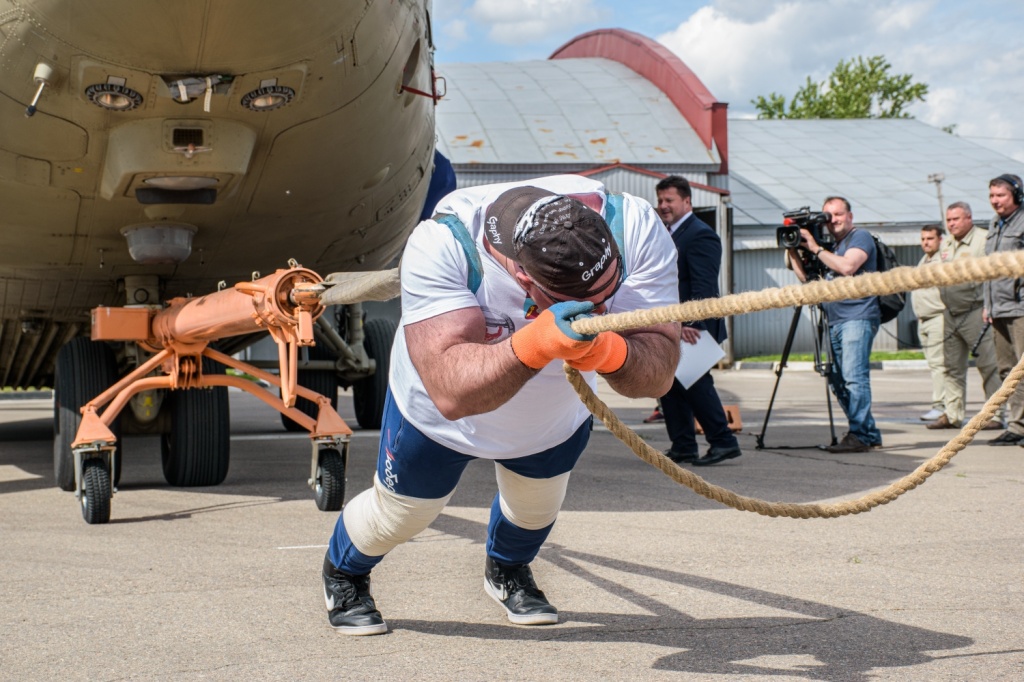
Feats of power
– How did you come to power extreme?
– It happened through social activities. It would be more correct to call those records that I have achieved as power performance. There is no competitive aspect in them. I perform the above as part of show programs or patriotic events, and once they have been performed, they become records. I did my best to combine the sports and entertainment aspects, to come up with something unusual. For example, I not only tow a helicopter, plane or ship, but I also inflate hot-water bottles, it has become a certain brand that draws attention in Russia and around the world.
What is the purpose of these performances? By no means it is personal chest-thumping - ah, I've done something that no one else does. Vanity and pride are alien to me as an Orthodox man. These are messages for people, especially young people. Cooperating with the Power Extreme Federation of Russia, we make vivid performances so that young people could see in their gadgets that a person is capable of unimaginable things through sports and healthy lifestyles. The famous athlete, showman Vladimir Turchinsky said that power performances were "feats of power", and naturally, they should always motivate people to do something.
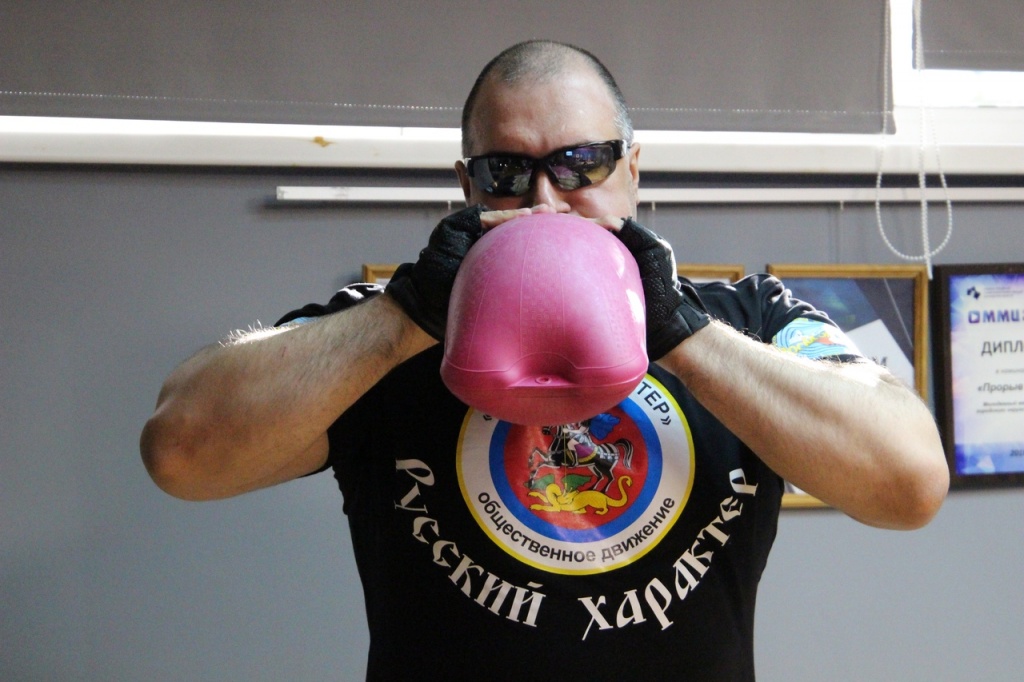
– How do you come up with your performances?
– We work as a team, plus we have accumulated considerable experience. We always think about what our performance should be dedicated to. Unfortunately, the pandemic makes its own adjustments. I've rehearsed a good performance - Extreme Run. I had to overcome 60 meters on the open track pulling the Rusich engine car weighing 50 tons off the ground without any such devices like a ladder nailed to the surface. And along the way, I planned to inflate the hot water bottles. The performance had to be rescheduled, but there are plenty of ideas.
– How do you prepare for the performances, how do you practice?
– As a rule, athletes in strength sports prepare for certain disciplines and train specific muscle groups before competitions. The complexity of my performances is that the entire body is under full strain. The whole body must be prepared. And it would be wrong to pay attention only to my back, legs, and arms as I pull the machinery by holding on to the rope. I had injuries because the other joints were unprepared. By the way, I get most of my injuries not during the performance, but during preparation.
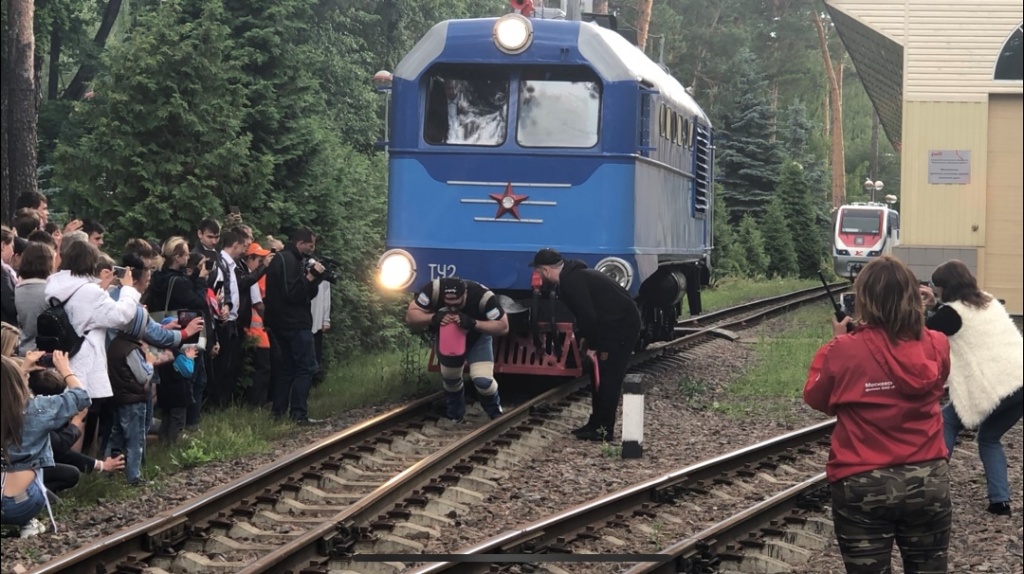
– Have you ever used the power and skill of towing a vehicle in your daily life?
– Yes, of course, I used to move my father's and brother's cars when it was required. Recently, I worked as a mechanic in the emergency service of the Lyubertsy Heating Network for three years, and the acquired skills were regularly useful to me on the road. During emergencies, abnormal situations happen. Besides cars, we had big pipes of the huge weight that were impossible for a crane or other equipment to approach. We had to move these pipes and other heavy objects by hand. You know, it's amazing what our men can do.
"Power without spirit means nothing"
– Your records are world ones. Do you have any connection or rivalry in absentia with powerlifters from abroad?
– We keep an eye on each other. Some of the professionals sometimes treat us with irony, but most of them respect us. We are in close contact with domestic power extreme stars. Our foreign colleagues watch us, like, and comment on us. I regret that I did not master foreign languages in due time, but people write to me from different countries using the Russian online translator. It's nice to be able to introduce foreigners to the Russian language.
I consider myself a Russian person with Armenian roots. I feel very close to the ideas of the Russian world.
I am an Orthodox, and I believe that the spiritual component is the major in my life and power records.
I have been injured a lot of times in my life, and there was even a period when I was in a wheelchair, but my faith helped me to overcome all that. I am convinced that power without spirit means nothing; it is a stupid, destructive force.
– Epic heroes of folk Russian legends would agree with you…
– Of course, a spiritual foundation can help achieve any "feat of power," whether on the battlefield or in the athletic arena.
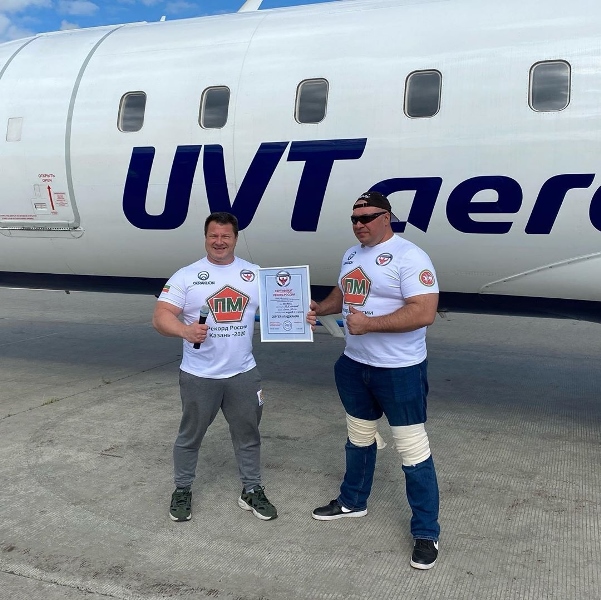
– Have you got any invitations to perform abroad, to star in a film?
– Again, there is interest from abroad. My last performance was filmed by several foreign TV channels, including Euronews and the Associated Press. And four other events were filmed by British channels. There are expectations that invitations to perform abroad will follow. For now, I treat this with a touch of irony; I would like to be useful in our country.
– How do you feel about the nickname Russian Hulk?
– The nickname came about when I first started doing performances and stunts. First, I was called the Hulk by the Moscow-area media. At the beginning I was skeptical since it was an image of Western mass culture. So I began to wonder how I should feel about this nickname. But then it was supplemented with Russian - the Russian Hulk, and I agreed with it. When my performances started going international, the media picked up on it, and the Russian Hulk stuck with me.
Yes, this is a Western image but we decided to redesign it for ourselves, to nationalize it (he smiles). I am not against Western culture in general and American culture in particular, but I regret to admit that our country does not produce so many films that could conquer the world market. Of course, I would like to see the images of our bogatyrs (Russian epic heroes) come into the homes of American, Chinese citizens.
New publications

 Mikhail Kalatozov, a director who transformed the world of cinematography in many ways, was born 120 years ago. He was a Soviet film official and a propagandist. Above all, he was capable of producing movies that struck viewers with their power and poetic language.
Mikhail Kalatozov, a director who transformed the world of cinematography in many ways, was born 120 years ago. He was a Soviet film official and a propagandist. Above all, he was capable of producing movies that struck viewers with their power and poetic language.  Ukrainian authorities have launched a persecution campaign against the canonical Ukrainian Orthodox Church (UOC), the biggest one in the country's modern history. Over the past year, state sanctions were imposed on clergy representatives, searches were conducted in churches, clergymen were arrested, criminal cases were initiated, the activity of the UOC was banned in various regions of the country, and monasteries and churches were seized.
Ukrainian authorities have launched a persecution campaign against the canonical Ukrainian Orthodox Church (UOC), the biggest one in the country's modern history. Over the past year, state sanctions were imposed on clergy representatives, searches were conducted in churches, clergymen were arrested, criminal cases were initiated, the activity of the UOC was banned in various regions of the country, and monasteries and churches were seized.  When Nektary Kotlyaroff, a fourth-generation Russian Australian and founder of the Russian Orthodox Choir in Sydney, first visited Russia, the first person he spoke to was a cab driver at the airport. Having heard that Nektariy's ancestors left Russia more than 100 years ago, the driver was astonished, "How come you haven't forgotten the Russian language?" Nektary Kotlyaroff repeated his answer in an interview with the Russkiy Mir. His affinity to the Orthodox Church (many of his ancestors and relatives were priests) and the traditions of a large Russian family brought from Russia helped him to preserve the Russian language.
When Nektary Kotlyaroff, a fourth-generation Russian Australian and founder of the Russian Orthodox Choir in Sydney, first visited Russia, the first person he spoke to was a cab driver at the airport. Having heard that Nektariy's ancestors left Russia more than 100 years ago, the driver was astonished, "How come you haven't forgotten the Russian language?" Nektary Kotlyaroff repeated his answer in an interview with the Russkiy Mir. His affinity to the Orthodox Church (many of his ancestors and relatives were priests) and the traditions of a large Russian family brought from Russia helped him to preserve the Russian language.

 The leaders of the Friends of the Great Russia cultural association (Amici Della Grande Russia) in Italy believe that the Western policy of abolishing Russian culture in Europe has finally failed. Furthermore, it was doomed to failure from the beginning.
The leaders of the Friends of the Great Russia cultural association (Amici Della Grande Russia) in Italy believe that the Western policy of abolishing Russian culture in Europe has finally failed. Furthermore, it was doomed to failure from the beginning.  Name of Vladimir Nemirovich-Danchenko is inscribed in the history of Russian theater along with Konstantin Stanislavski, the other founding father of the Moscow Art Theater. Nevertheless, Mr. Nemirovich-Danchenko was a renowned writer, playwright, and theater teacher even before their famous meeting in the Slavic Bazaar restaurant. Furthermore, it was Mr. Nemirovich-Danchenko who came up with the idea of establishing a new "people's" theater believing that the theater could become a "department of public education."
Name of Vladimir Nemirovich-Danchenko is inscribed in the history of Russian theater along with Konstantin Stanislavski, the other founding father of the Moscow Art Theater. Nevertheless, Mr. Nemirovich-Danchenko was a renowned writer, playwright, and theater teacher even before their famous meeting in the Slavic Bazaar restaurant. Furthermore, it was Mr. Nemirovich-Danchenko who came up with the idea of establishing a new "people's" theater believing that the theater could become a "department of public education."  "Russia is a thing of which the intellect cannot conceive..." by Fyodor Tyutchev are famous among Russians at least. December marks the 220th anniversary of the poet's birth. Yet, he never considered poetry to be his life's mission and was preoccupied with matters of a global scale. Mr.Tyutchev fought his war focusing on relations between Russia and the West, the origins of mutual misunderstanding, and the origins of Russophobia. When you read his works today, it feels as though he saw things coming in a crystal ball...
"Russia is a thing of which the intellect cannot conceive..." by Fyodor Tyutchev are famous among Russians at least. December marks the 220th anniversary of the poet's birth. Yet, he never considered poetry to be his life's mission and was preoccupied with matters of a global scale. Mr.Tyutchev fought his war focusing on relations between Russia and the West, the origins of mutual misunderstanding, and the origins of Russophobia. When you read his works today, it feels as though he saw things coming in a crystal ball...